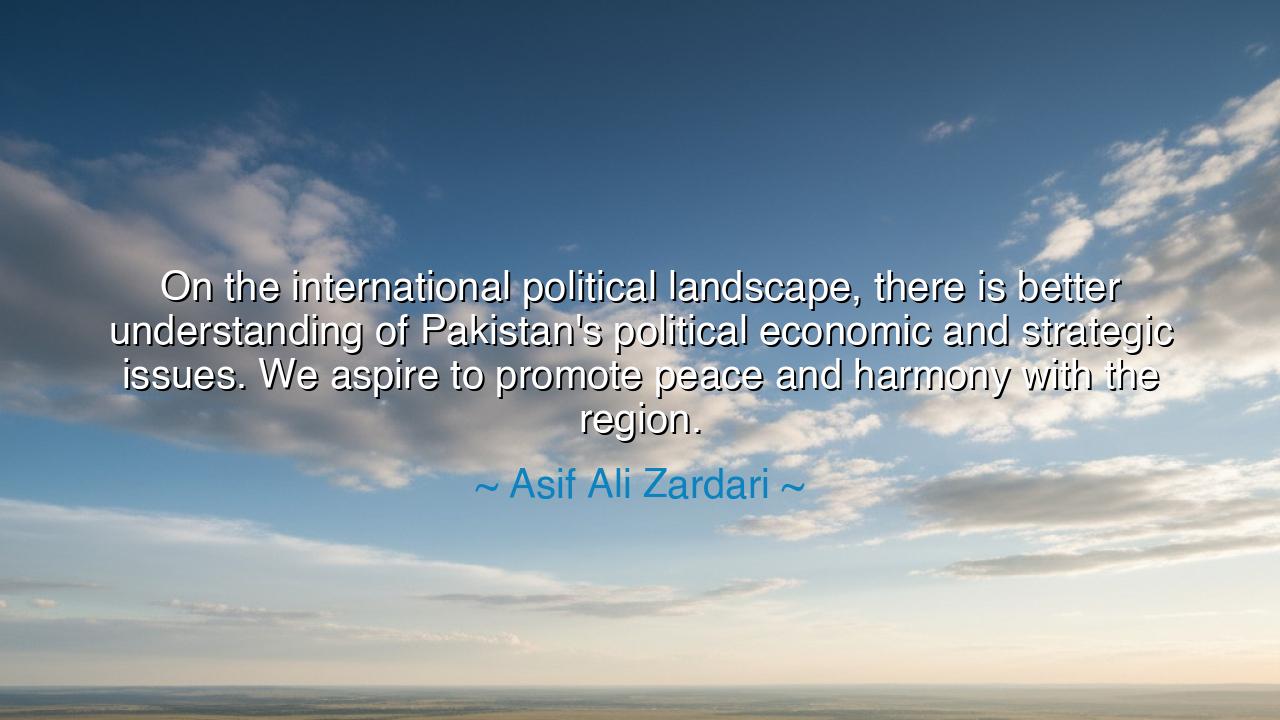
On the international political landscape, there is better
On the international political landscape, there is better understanding of Pakistan's political economic and strategic issues. We aspire to promote peace and harmony with the region.






Hear the words of Asif Ali Zardari, spoken in a time when his nation bore the weight of trials, yet still sought the light of reconciliation: “On the international political landscape, there is better understanding of Pakistan's political economic and strategic issues. We aspire to promote peace and harmony with the region.” These are not merely the words of a politician, but the cry of a nation long entangled in storms, reaching for the steady horizon of peace. For in them lies a truth older than empires—that a people, though scarred by history, can still lift their gaze to the hope of harmony with neighbors and with the world.
The origin of this saying arises from Pakistan’s enduring struggles: conflict with its neighbors, challenges of poverty and instability, and the gaze of the global community that has often misunderstood its burdens. Zardari, having lived through turmoil both personal and political, spoke these words to remind the world that understanding is the first step toward reconciliation. When the nations of the earth see one another’s struggles with clarity, when suspicion is replaced by recognition of shared humanity, then the path to cooperation begins to open.
History has shown this pattern before. Consider the story of post-war Europe. After centuries of conflict culminating in two world wars, France and Germany, once sworn enemies, chose not to define themselves by suspicion but by partnership. The formation of the European Union was not born of blindness to past wounds but of the recognition that peace and prosperity could only come through understanding and mutual respect. What Zardari called for—better comprehension of his nation’s struggles—is the same seed that has borne fruit in other lands.
In his words also lies a principle for every human bond: harmony is not born of force but of empathy. A neighbor may guard his gate with weapons, but true safety comes when trust replaces fear. So too with nations: treaties written with suspicion fade, but those written with recognition of shared burdens endure. Zardari spoke not of domination, but of aspiration—to weave Pakistan into the fabric of the region, not as a rival, but as a partner in peace.
Yet let us not imagine that this path is simple. To aspire to harmony is to labor with patience, for wounds are slow to heal and suspicion quick to return. But the alternative is endless strife. Herein lies the courage of his words: to proclaim peace in a time of difficulty is itself an act of defiance against despair. To aspire when the present is turbulent is to declare faith that the future can be different. Such faith has always been the engine of transformation, from prophets to reformers, from nations in ruin to nations reborn.
This teaching belongs not only to governments but to our personal lives. In families, in friendships, in workplaces, the same truth reigns: understanding leads to peace. When we take the time to grasp the struggles of another, to see through their eyes, suspicion dissolves, and harmony emerges. If nations can aspire to this on the world stage, how much more must we aspire to it in the small circles of our daily existence?
Therefore, remember Zardari’s words: “We aspire to promote peace and harmony with the region.” Take them not as distant politics, but as living wisdom. Aspire always to better understanding—whether of a nation, a neighbor, or even of yourself. Let empathy be the bridge you build, and let harmony be the harvest of your labor. For the destiny of nations and the peace of the world begin in the same place: in the simple choice of each soul to seek understanding, and from that understanding, to sow peace.
–––






DHChe Dinh Hieu
This quote makes me think about the delicate balance between national interest and regional peace. As Pakistan faces internal challenges, how can the international community better support its efforts toward harmony without compromising its sovereignty? What role does Pakistan’s strategic position play in this equation? Are there any potential pitfalls in focusing too heavily on peace, or is this the only path forward for lasting stability in the region?
MTNgo Pham Minh Tam
Zardari’s focus on promoting peace with the region is commendable, but I’m curious how this understanding of Pakistan's political and economic challenges is being communicated internationally. Is there a genuine effort from other countries to support Pakistan's goals, or are there still lingering doubts about the nation’s role in regional stability? How can Pakistan ensure that its strategic aspirations align with the interests of neighboring countries to avoid future conflicts?
TK10CP-SN-26- Huynh Ngo Trung Kien
The idea of promoting peace and harmony in the region sounds noble, but it makes me wonder: how do we measure true understanding in the international political landscape? Is understanding enough, or do we need more concrete efforts to address the underlying political and economic challenges? Can peace be achieved solely through diplomatic dialogue, or is military and economic strategy also necessary in Pakistan’s case to secure long-term stability?
BPBui Thi Bich Phuong
It’s encouraging to hear Asif Ali Zardari speak about promoting peace and harmony in the region. But how realistic is it to achieve this goal, given the complex political and economic issues Pakistan faces, as well as the historical tensions with its neighbors? What steps can be taken to ensure that this understanding of Pakistan's challenges translates into meaningful diplomacy? Are there specific policies or actions that need to be prioritized to move from aspiration to action?